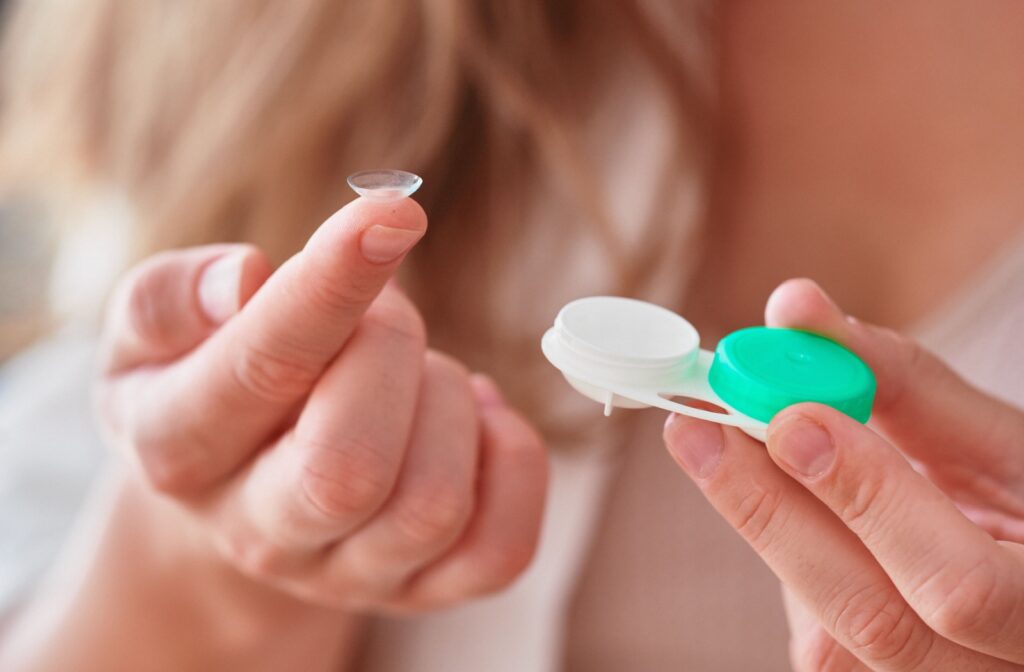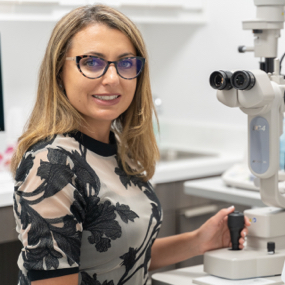Contact lenses are an amazing alternative to traditional glasses. They bring comfort, convenience, and clarity to your everyday life. Whether you’re dealing with myopia, astigmatism, or even dry eyes, contact lenses can be a great choice.
However, contact lenses can go bad, especially without proper maintenance. Expired or damaged lenses can affect your vision and eye health, so always check the expiration date. If your lenses are expired, visit your optometrist to discuss replacing them.
The Average Lifespan of Contact Lenses
Contact lenses are carefully crafted with special materials. These aren’t just used to give a clear surface to see through. Instead, they should also keep your eyes comfortable. Meanwhile, oxygen needs to pass through the material to help the eye stay nourished.
Every lens is made to last differently. Dailies are meant to last for one day, while others like monthlies are designed to last 30 days. It is important to note that even if the case is unopened, the lenses can expire.
This is why there’s a clear expiration date on every case and lens package. Make sure to always pay attention to this lens to avoid using expired lenses.
Different Types of Contact Lenses
How often you need to replace your contact lenses depends on the type you use. Each type is designed to work for a specific timeframe with proper care and handling.
Usually, lenses can be broken down into these categories:
- Daily disposable lenses are designed for single use. These should always be discarded at the end of the day.
- Bi-weekly lenses, which can be used for up to 14 days when cleaned and stored correctly.
- Monthly lenses, which are made to last up to 30 days with consistent maintenance
Other options include specialty lenses or rigid gas-permeable lenses. The specific lifespan of your lenses depends on the expiration date printed on the case and package.
What Makes Contact Lenses Expire?
Contact lenses, like any disposable product, aren’t immune to wear and tear. Even if you store them correctly, they wear down over time.
Manufacturers usually package contact lenses in sterile, airtight packaging. Over time, the seals can deteriorate, leaving lenses exposed to bacteria in the environment. Meanwhile, the lenses themselves can break down, leading to scratches and warping.
Even if lenses remain sealed, they’re vulnerable to contamination and chemical breakdown. This can lead to irritation, discomfort, and even infection in some situations.
Can You Wear Expired Contacts?
It might be tempting to wear expired contact lenses, especially if they don’t look any different. However, this comes with serious risks. In some situations, expired lenses can even lead to long-term vision problems.
Expired lenses can lead to:
- Blurred or impaired vision
- Eye irritation and discomfort
- Reduced oxygen permeability to the eyes
- Potential scratches or damage to the cornea
Old lenses can even carry bacteria or fungi that can cause infections if they are inserted. Eye infections are serious problems, and they can permanently damage your vision. So, if your lenses are expired, it’s time to visit your optometrist to discuss replacements.
How Often Should You Replace Your Contacts?
Replacing contact lenses on time protects your eyes. It means you can avoid uncomfortable symptoms and keep your vision clear. It helps to regularly inspect your lenses and look for signs of visual wear and tear.

Some signs your lenses need replacing include:
- Cloudiness or a scratchy feeling when wearing your lenses.
- Visible discolouration or damage.
- Persistent discomfort, even after cleaning them.
- Redness or irritation that doesn’t go away.
- Expired dates are printed on your packaging.
Preparing ahead of time is key. Always check your expiration dates, you should treat your contact lenses like medical devices. If they’re nearing expiration, it’s time to visit your optometrist for a contact lens fitting and exam. Your optometrist can update your prescription and make sure you have fresh lenses ready when you need them.
How to Take Care of Contact Lenses
Caring for your contact lenses plays a key role in keeping your eyes healthy. A proper routine keeps your lenses in better shape and lowers the risk of problems.
So make sure to:
- Wash your hands with soap and dry them thoroughly before handling lenses.
- Keep lenses away from water to prevent contamination from tap, pool, or shower water.
- Avoid napping or sleeping in lenses unless directed by your optometrist.
- Never rinse your contacts with tap water due to a risk of a serious bacterial infection, always use fresh cleaning solution .
For Bi-weekly or Monthly lenses:
- Use fresh cleaning solution every day, and never reuse old solution.
- Store lenses in a clean case and replace that case every 3 months.
These seem like small steps. But you’d be surprised what a difference proper care makes!
Protecting Your Eye Health
Contact lenses are extremely convenient. They offer a comfortable way to see the world clearly, but they do require some extra care.
If your lenses are expired, it’s time for a contact lens exam, and our team at Brantford Eye Care is here to help. We’ll support you every step of the way, so book an appointment with our team today!




